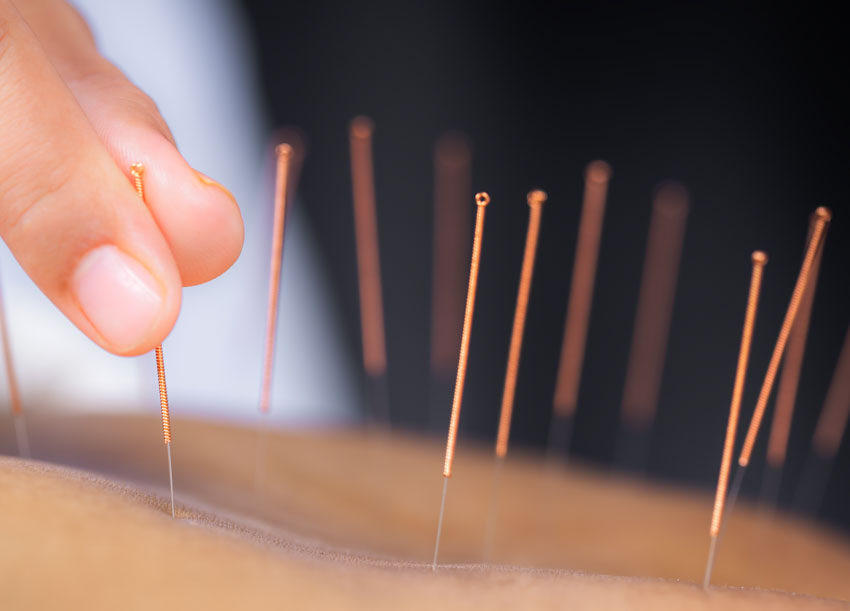
Acupuncture demonstrates positive effects in supporting healthy weight reduction along with the alleviation of hunger sensations, fatigue, and abdominal distension. A widespread health concern, over 4 million people die annually due to complications caused by excess weight. [1] A body mass index (BMI) in excess of 25 is defined as overweight and a BMI greater than 30 is defined as obese. Research demonstrates that adding acupuncture to dietary and lifestyle management programs significantly improves patient outcomes.
According to traditional Chinese medicine (TCM) principles, obesity is caused by an imbalance of energy, both consumed and expended. This causes what is termed damp stagnation in TCM. Obesity is associated with metabolism and bodily function, which correlates to TCM defined spleen and stomach qi deficiency, stomach heat, blood stasis, and liver qi depression. [2] This TCM diagnostic parameter is related to digestion, the function of the pancreas, and the balance of the insulin-glucagon pathway. Clinical research reveals that appropriate acupuncture treatments, selected based on a patient’s body type, has the ability to restore bodily balance, improve physical well-being, and promote healthy weight loss. [3]
Investigations show significant decreases in BMI through the use of adjunctive acupuncture therapy. The addition of acupuncture to lifestyle and dietary management produces superior patient outcomes when compared with lifestyle and dietary management absent the benefits of acupuncture. In one hospital study in Qingdao, 67 patients were classified into 4 categories: gastrointestinal heat type (16 cases), liver depression with qi stagnation type (17 cases), spleen deficiency and excess dampness type (16 cases), and qi deficiency with blood stagnation type (18 cases). All patients received acupuncture treatments over a 15-week period. The main acupuncture points used for weight management were concentrated at the abdominal area:
- CV6 (Qihai)
- CV4 (Guanyuan)
- CV12 (Zhongwan)
- CV10 (Xiawan)
- ST25 (Tianshu)
- SP15 (Daheng)
Needles were also applied on the limbs:
- ST36 (Zusanli)
- SP6 (Sanyinjiao)
- GB31(Fengshi)
Around the waist, the following points were selected:
- GB26 (Daimai)
- GB27 (Wushu)
- GB28 (Weidao)
In addition, extra acupuncture points were chosen based on the specific body types of the patients. Patients received 45 minute treatments, twice a week. After 15 weeks, average BMI decreased from 32.3 ±3.6 to 27.3 ±3.1 kg, average weight dropped from 77.3 ±10.6 to 71.5 ±13.2 kg. [4]
In a related study, researchers in the Huaian Traditional Chinese Medicine Hospital conducted a clinical trial with 100 patients. Patients received three months of treatment, with daily treatment for the first 15 days, then every other day for the remainder of time. Average BMI showed significant decreases, dropping from 26.02 ±0.86 to 23.02 ±0.54 kg. Average weight declined from 79.48 ±5.16 to 68.66 ±4.31 kg. [5] The acupuncture points used for patients with fat distributed evenly over the abdominal area were as follows:
- CV11 (Jianli)
- CV6 (Qihai)
- SP15 (Daheng)
For patients whose upper abdominal area accumulated more fat, the following acupuncture points were used:
- CV12 (Zhongwan)
- CV10 (Xiawan)
- CV9 (Shuifen)
- ST24 (Huaroumen)
For patients with fat concentration mostly on the lower abdominal area, the following acupuncture points were used: [5]
- CV4(Guanyuan)
- ST26 (Wailing)
- SP14 (Fujie)
The research demonstrates that acupuncture is a useful form of adjunctive care for the promotion of healthy weight loss when combined with dietary and lifestyle changes. In addition, the research indicates that optimal outcomes depend upon selecting specific acupuncture points according to individual patient needs.
References:
[1] who.int/news-room/fact-sheets/detail/obesity-and-overweight
[2] Yangyadong, “Observation of the results of acupuncture for weight loss”. Chinese Journal of Trauma and Disability Medicine, 2011, 19(10):43-43.
[3] Hou Yuduo, “The application of abdominal acupuncture points in weight loss”. Chinese Remedies Clinics, 011,11(9):1103-1104.
[4] WANG Li-li, WANG Chen, “Clinical analysis of acupuncture point method for weight loss”. Chinese Journal of Aesthetic Medicine. 2015.24.15.
[5] Liu Meizhang, Liu Yongtao, “The Clinical application of abdominal acupuncture points in weight loss,” Electronic Journal of Clinical Medical Literature.


